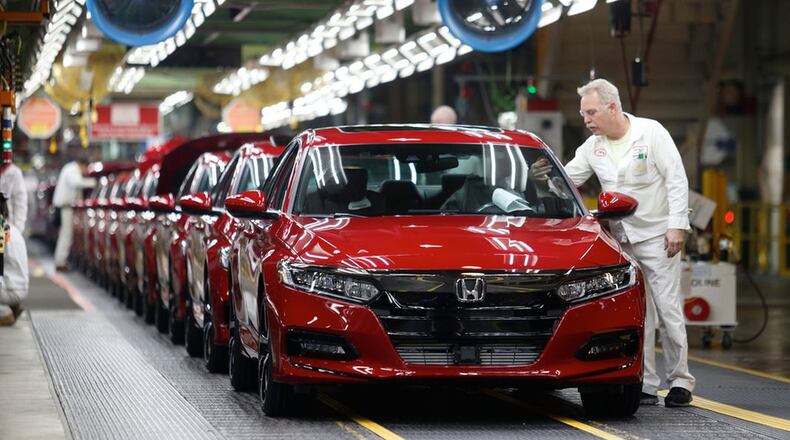The email also states: “Honda has taken an abundance of caution when an associate, contingent associate or contractor tests positive for COVID-19. When there is a positive or suspected case, we conduct thorough contact tracing to identify anyone who may have been exposed to the impacted associate and we ask him or her to quarantine.”
The email is addressed to “purchasing division associates.”
“Many of you have already supported the production team in the last several weeks, and for that, I would like that thank you,” the email says. “It currently appears as if this situation will likely continue for a few more weeks.”
Asked to confirm or correct the report, a Honda spokesman, Chris Abbruzzese, released this statement Wednesday:
“Due to strong customer demand for our products and the need to carefully manage production during the COVID-19 pandemic, we are facing some temporary staffing issues that require support from associates who do not typically work in production,” Honda’s statement said. “We have implemented such temporary measures in the past, and are working diligently to attract and hire associates to support our production needs.”
Abbruzzese did not respond to a question about the email included in the WOSU report.
Michelle Krebs, senior director of automotive relations for Cox Automotive and executive analyst for Autotrader, said Wednesday that industry observers know that plants everywhere have been struggling in what has been an “unprecedented” situation.
“We never have seen almost every auto plant in the world shut down,” Krebs said.
Heightening the issue is what Krebs said is tight inventory for Honda, well below the national average: 58 days’ supply for Honda; and 61 days’ supply for Acura.
Honda’s high-volume models, made in Ohio, are “super low” in supply: 55 days’ for Accord; 55 for the Honda Civic; 56 for the Honda CR-V, while the Honda Pilot is down to 39, she said.
Earlier in July, media reports said GM and Ford were struggling with worker no-shows and illnesses in their plants.
Kristen Dziczek, vice president, research, for the Center for Automotive Research, said automakers are making “herculean efforts” to keep plants staffed, she said.
“I don’t think it’s insurmountable, but certainly there’s a lot more reason for absenteeism and illness right now than there was in the past,” she said.
Demand for new cars is probably stronger than anyone expected, given the high unemployment rate and the slow economy, she also said.
“We’re still seeing relatively healthy demand, a relatively health supply chain and a relatively healthy workforce. And we need all three things to keep this machine running,” Dziczek said.
But she also cautioned: “It’s not going to be the year we planned last year.”
“Taking care of the virus is the first thing to get back to any semblance of normal,” Krebs said.
In mid-May Honda began to gradually resume auto, engine and transmission production in its U.S. and Canadian plants, ending a suspension of production that had started March 23 this year.
Nearly all North American auto plants ceased production in March, as the pandemic and attendant fears tightened their grip.
Honda is one of the largest employers in the region, with thousands of workers from the Dayton area and Clark County working at several of the company’s plants.
About the Author

